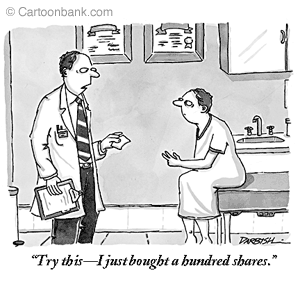jg152015@ohio.edu
When dealing with conflicts of interest, there is a fine line journalists must walk. The difference between good publicity and bad publicity can be determined by one seemingly meaningless decision we make in our careers. So how exactly do we decide what choices are right or wrong?
Let's start with the basics: what exactly is a conflict of interest? The Balance describes it as "a situation in which an individual has competing interests or loyalties."
To make the conversation easier, we'll use an example from the comic strip below:
 |
| Image courtesy of PRSSA |
In the case of this doctor, the conflict of interest is fairly obvious. Most people will agree it is unethical for a medical professional to prescribe his patients a drug he has stock in or has any sort of personal relation to. Scenarios like this are common in today's society. Everyone desires personal gain, and journalists are in unique positions where they can make or break someone. It's why they tell us in college never to accept gifts from clients or develop too personal of a connection.
According to the Society of Professional Journalists' Code of Ethics, journalists should "avoid conflicts of interest, real or perceived. Disclose unavoidable conflicts."
The key in any situation such as this one is transparency. Whether it be a doctor, a journalist, or even a personal trainer, keeping secrets from your clients and the public will only lead to greater backlash. As long as we let our audience know what's going on and the choices we are making and why, we are living up to our duties as journalists.
According to PRSA’s Professional Standards Advisory PS-11, “Conflicts of interests have the potential to undermine or compromise the impartiality, credibility or trustworthiness of a practitioner due to the possibility of a clash between a practitioner’s self-interest and a professional-interest, or their public-interest, or their client’s interest.”
Any situation where there could be some sort of personal gain has the potential to become a conflict of interest. The best way to avoid it is (obviously) to make the ethically correct decision. When faced with a challenge, journalists must analyze the situation, determine the stakeholders, then proceed confidently with their choice. Plus, it never hurts to get a second or even third opinion from a friend or colleague. The PRSA Ethical Decision-Making Guide outlines six key steps to help journalists and other professionals avoid ethical dilemmas:
1. Define the specific ethical issue/conflict.
2. Identify internal/external factors (e.g., legal, political, social, economic) that may influence the decision.
3. Identify key values.
4. Identify the parties who will be affected by the decision and define the public relations professional’s obligation to each.
5. Select ethical principles to guide the decision-making process.
6. Make a decision and justify it.
My personal opinion? It all comes down to our own individual moral codes. What seems right to you may feel wrong to me, and the opportunity you passed up because you felt in your heart it was unethical might be an easy win for the company two blocks over. There really is no definite way to determine what decisions are right or wrong. People will applaud us, berate us, and everything in between for anything we say or write. As long as we stick to our personal codes and fight for the decisions we make, I think we'll all be just fine.
No comments:
Post a Comment